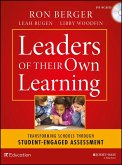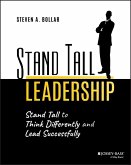Tony Wagner, Robert Kegan, Lisa Laskow Lahey, Richard W. Lemons, Jude Garnier, Deborah Helsing, Annie Howell, Harriette Thurber Rasmussen
Change Leadership (eBook, PDF)
A Practical Guide to Transforming Our Schools
28,99 €
28,99 €
inkl. MwSt.
Sofort per Download lieferbar

0 °P sammeln
28,99 €
Als Download kaufen

28,99 €
inkl. MwSt.
Sofort per Download lieferbar

0 °P sammeln
Jetzt verschenken
Alle Infos zum eBook verschenken
28,99 €
inkl. MwSt.
Sofort per Download lieferbar
Alle Infos zum eBook verschenken

0 °P sammeln
Tony Wagner, Robert Kegan, Lisa Laskow Lahey, Richard W. Lemons, Jude Garnier, Deborah Helsing, Annie Howell, Harriette Thurber Rasmussen
Change Leadership (eBook, PDF)
A Practical Guide to Transforming Our Schools
- Format: PDF
- Merkliste
- Auf die Merkliste
- Bewerten Bewerten
- Teilen
- Produkt teilen
- Produkterinnerung
- Produkterinnerung

Bitte loggen Sie sich zunächst in Ihr Kundenkonto ein oder registrieren Sie sich bei
bücher.de, um das eBook-Abo tolino select nutzen zu können.
Hier können Sie sich einloggen
Hier können Sie sich einloggen
Sie sind bereits eingeloggt. Klicken Sie auf 2. tolino select Abo, um fortzufahren.

Bitte loggen Sie sich zunächst in Ihr Kundenkonto ein oder registrieren Sie sich bei bücher.de, um das eBook-Abo tolino select nutzen zu können.
The Change Leadership Group at the Harvard School of Education has, through its work with educators, developed a thoughtful approach to the transformation of schools in the face of increasing demands for accountability. This book brings the work of the Change Leadership Group to a broader audience, providing a framework to analyze the work of school change and exercises that guide educators through the development of their practice as agents of change. It exemplifies a new and powerful approach to leadership in schools.
- Geräte: PC
- mit Kopierschutz
- eBook Hilfe
- Größe: 2.13MB
Andere Kunden interessierten sich auch für
![The Jossey-Bass Reader on Educational Leadership (eBook, PDF) The Jossey-Bass Reader on Educational Leadership (eBook, PDF)]() The Jossey-Bass Reader on Educational Leadership (eBook, PDF)36,99 €
The Jossey-Bass Reader on Educational Leadership (eBook, PDF)36,99 €![Leaders of Their Own Learning (eBook, PDF) Leaders of Their Own Learning (eBook, PDF)]() Ron BergerLeaders of Their Own Learning (eBook, PDF)21,99 €
Ron BergerLeaders of Their Own Learning (eBook, PDF)21,99 €![Dealing with the Tough Stuff (eBook, PDF) Dealing with the Tough Stuff (eBook, PDF)]() John GabrielDealing with the Tough Stuff (eBook, PDF)17,99 €
John GabrielDealing with the Tough Stuff (eBook, PDF)17,99 €![Stand Tall Leadership (eBook, PDF) Stand Tall Leadership (eBook, PDF)]() Steven A. BollarStand Tall Leadership (eBook, PDF)20,99 €
Steven A. BollarStand Tall Leadership (eBook, PDF)20,99 €![Empowered Educators (eBook, PDF) Empowered Educators (eBook, PDF)]() Linda Darling-HammondEmpowered Educators (eBook, PDF)35,99 €
Linda Darling-HammondEmpowered Educators (eBook, PDF)35,99 €![Preparing Principals for a Changing World (eBook, PDF) Preparing Principals for a Changing World (eBook, PDF)]() Linda Darling-HammondPreparing Principals for a Changing World (eBook, PDF)32,99 €
Linda Darling-HammondPreparing Principals for a Changing World (eBook, PDF)32,99 €![The Principal (eBook, PDF) The Principal (eBook, PDF)]() Michael FullanThe Principal (eBook, PDF)14,99 €
Michael FullanThe Principal (eBook, PDF)14,99 €-
-
-
The Change Leadership Group at the Harvard School of Education has, through its work with educators, developed a thoughtful approach to the transformation of schools in the face of increasing demands for accountability. This book brings the work of the Change Leadership Group to a broader audience, providing a framework to analyze the work of school change and exercises that guide educators through the development of their practice as agents of change. It exemplifies a new and powerful approach to leadership in schools.
Dieser Download kann aus rechtlichen Gründen nur mit Rechnungsadresse in A, B, BG, CY, CZ, D, DK, EW, E, FIN, F, GR, HR, H, IRL, I, LT, L, LR, M, NL, PL, P, R, S, SLO, SK ausgeliefert werden.
Produktdetails
- Produktdetails
- Verlag: John Wiley & Sons
- Seitenzahl: 304
- Erscheinungstermin: 27. September 2010
- Englisch
- ISBN-13: 9780470730638
- Artikelnr.: 38184338
- Verlag: John Wiley & Sons
- Seitenzahl: 304
- Erscheinungstermin: 27. September 2010
- Englisch
- ISBN-13: 9780470730638
- Artikelnr.: 38184338
- Herstellerkennzeichnung Die Herstellerinformationen sind derzeit nicht verfügbar.
Tony Wagner is co-director of the Change Leadership Group (CLG) at the Harvard Graduate School of Education. He is also Education Chair of the Harvard Seminar on Redesigning American High Schools. He consults widely with schools, districts, and foundations around the country and internationally and is Senior Advisor to the Bill & Melinda Gates Foundation. Wagner is the author of Making the Grade and How Schools Change. Robert Kegan is co-director of the Change Leadership Group (CLG), and Meehan Professor of Adult Learning and Professional Development at the Harvard Graduate School of Education. His work focuses on the importance of continued psychological development in adulthood. Kegan is the recipient of numerous awards and honors, including four honorary doctorates and the Massachusetts Psychological Association's Techer of the Year award. He is author of The Evolving Self and (with Lisa Laskow Lahey) How the Way We Talk Can Change the Way We Work. Lisa Laskow Lahey is associate director of the Change Leadership Group at the Harvard Graduate School of Education. For over 20 years she has been a consultant to schools and businesses helping to turn workplace problems and issues into opportunities for transformational learning. A former principal and high school teacher, Lahey is co-founder and senior consultant at Minds at Work, a consulting firm specializing in school and workplace learning in the U.S. and Europe. She is co-author (with Robert Kegan) of How the Way We Talk Can Change the Way We Work.
Foreword.
Preface.
Acknowledgments.
About the Authors.
ONE: Introduction: Reframing the Problem.
A Knowledge Economy Requires New Skills for All Students.
Greater Supports for Learning in a Changing Society.
Reform or Reinvention? Technical Challenges Versus Adaptive Challenges.
Organizational Beliefs and Behaviors.
Individual Beliefs and Behaviors.
Accepting the Challenge and the Risks:Moving Toward Communities of Practice
via Collaborative Learning.
PART ONE: Improving Instruction.
TWO: Creating a Vision of Success.
Challenges to Improving Instruction.
Seven Disciplines for Strengthening Instruction.
Using the Seven Disciplines.
Launching an Instructional Improvement System: The Critical First
Conversations.
Developing a Shared Vision.
Defining a New Framework for Effective Instruction.
Linking the New 3 R's of Instruction.
THREE: Committing Ourselves to the Challenge.
Identifying Your Commitment.
Spotting Your Obstacles Through Self-Reflection.
Reflections.
PART TWO: Why Is This So Hard?
FOUR: Generating Momentum for Change.
Obstacles to Improvement Versus Momentum for Improvement.
Generating the Momentum for Systemic Change.
Communities of Practice as a Strategy.
FIVE: Exploring Individual Immunities to Change.
Attending to Countering Behaviors.
A Deeper Look.
Finding the Competing Commitment.
Taking the Next Step.
Reflections.
PART THREE: Thinking Systemically.
SIX Relating the Parts to the Whole.
Arenas of Change.
Toward Transformation: Using the 4 C's.
Another Use for the 4 C's.
SEVEN: The Individual as a Complex System.
Hidden Commitments and Personal Immunities.
Big Assumptions and Immunities.
Reflections.
PART FOUR: Working Strategically.
EIGHT: The Ecology of Change.
Phases of Whole-System Change.
Change Levers: Data, Accountability, and Relationships.
Strategic Change in Action.
Putting the Pieces Together: The Ecology of Educational Transformation.
Measuring Success and the Challenge of High-Stakes Test Scores.
NINE: Overturning Your Immunities to Change.
Steps Toward Individual Change.
Considering Steps for the Most Powerful Learning.
Phases in Overturning Your Immunities.
Becoming Fully Released from Immunities to Change.
Reflections.
TEN: Conclusion: Bringing the Outward and Inward Focus Together.
Hold High Expectations for All Our Students.
Involve Building and Central Office Administrators in Instruction.
Choose a Priority and Stay Relentlessly Focused on It.
Foster a Widespread Feeling of Urgency for Change.
Encourage a New Kind of Leader.
Develop a New Kind of Administrative Team.
Shining a Broader Light on Change.
Implications for the Change Leader: Toward Adaptive Work.
Concluding . . . or Commencing?
APPENDIXES.
A. Team Exercises.
B. Recommended Reading.
Index.
Preface.
Acknowledgments.
About the Authors.
ONE: Introduction: Reframing the Problem.
A Knowledge Economy Requires New Skills for All Students.
Greater Supports for Learning in a Changing Society.
Reform or Reinvention? Technical Challenges Versus Adaptive Challenges.
Organizational Beliefs and Behaviors.
Individual Beliefs and Behaviors.
Accepting the Challenge and the Risks:Moving Toward Communities of Practice
via Collaborative Learning.
PART ONE: Improving Instruction.
TWO: Creating a Vision of Success.
Challenges to Improving Instruction.
Seven Disciplines for Strengthening Instruction.
Using the Seven Disciplines.
Launching an Instructional Improvement System: The Critical First
Conversations.
Developing a Shared Vision.
Defining a New Framework for Effective Instruction.
Linking the New 3 R's of Instruction.
THREE: Committing Ourselves to the Challenge.
Identifying Your Commitment.
Spotting Your Obstacles Through Self-Reflection.
Reflections.
PART TWO: Why Is This So Hard?
FOUR: Generating Momentum for Change.
Obstacles to Improvement Versus Momentum for Improvement.
Generating the Momentum for Systemic Change.
Communities of Practice as a Strategy.
FIVE: Exploring Individual Immunities to Change.
Attending to Countering Behaviors.
A Deeper Look.
Finding the Competing Commitment.
Taking the Next Step.
Reflections.
PART THREE: Thinking Systemically.
SIX Relating the Parts to the Whole.
Arenas of Change.
Toward Transformation: Using the 4 C's.
Another Use for the 4 C's.
SEVEN: The Individual as a Complex System.
Hidden Commitments and Personal Immunities.
Big Assumptions and Immunities.
Reflections.
PART FOUR: Working Strategically.
EIGHT: The Ecology of Change.
Phases of Whole-System Change.
Change Levers: Data, Accountability, and Relationships.
Strategic Change in Action.
Putting the Pieces Together: The Ecology of Educational Transformation.
Measuring Success and the Challenge of High-Stakes Test Scores.
NINE: Overturning Your Immunities to Change.
Steps Toward Individual Change.
Considering Steps for the Most Powerful Learning.
Phases in Overturning Your Immunities.
Becoming Fully Released from Immunities to Change.
Reflections.
TEN: Conclusion: Bringing the Outward and Inward Focus Together.
Hold High Expectations for All Our Students.
Involve Building and Central Office Administrators in Instruction.
Choose a Priority and Stay Relentlessly Focused on It.
Foster a Widespread Feeling of Urgency for Change.
Encourage a New Kind of Leader.
Develop a New Kind of Administrative Team.
Shining a Broader Light on Change.
Implications for the Change Leader: Toward Adaptive Work.
Concluding . . . or Commencing?
APPENDIXES.
A. Team Exercises.
B. Recommended Reading.
Index.
Foreword.
Preface.
Acknowledgments.
About the Authors.
ONE: Introduction: Reframing the Problem.
A Knowledge Economy Requires New Skills for All Students.
Greater Supports for Learning in a Changing Society.
Reform or Reinvention? Technical Challenges Versus Adaptive Challenges.
Organizational Beliefs and Behaviors.
Individual Beliefs and Behaviors.
Accepting the Challenge and the Risks:Moving Toward Communities of Practice
via Collaborative Learning.
PART ONE: Improving Instruction.
TWO: Creating a Vision of Success.
Challenges to Improving Instruction.
Seven Disciplines for Strengthening Instruction.
Using the Seven Disciplines.
Launching an Instructional Improvement System: The Critical First
Conversations.
Developing a Shared Vision.
Defining a New Framework for Effective Instruction.
Linking the New 3 R's of Instruction.
THREE: Committing Ourselves to the Challenge.
Identifying Your Commitment.
Spotting Your Obstacles Through Self-Reflection.
Reflections.
PART TWO: Why Is This So Hard?
FOUR: Generating Momentum for Change.
Obstacles to Improvement Versus Momentum for Improvement.
Generating the Momentum for Systemic Change.
Communities of Practice as a Strategy.
FIVE: Exploring Individual Immunities to Change.
Attending to Countering Behaviors.
A Deeper Look.
Finding the Competing Commitment.
Taking the Next Step.
Reflections.
PART THREE: Thinking Systemically.
SIX Relating the Parts to the Whole.
Arenas of Change.
Toward Transformation: Using the 4 C's.
Another Use for the 4 C's.
SEVEN: The Individual as a Complex System.
Hidden Commitments and Personal Immunities.
Big Assumptions and Immunities.
Reflections.
PART FOUR: Working Strategically.
EIGHT: The Ecology of Change.
Phases of Whole-System Change.
Change Levers: Data, Accountability, and Relationships.
Strategic Change in Action.
Putting the Pieces Together: The Ecology of Educational Transformation.
Measuring Success and the Challenge of High-Stakes Test Scores.
NINE: Overturning Your Immunities to Change.
Steps Toward Individual Change.
Considering Steps for the Most Powerful Learning.
Phases in Overturning Your Immunities.
Becoming Fully Released from Immunities to Change.
Reflections.
TEN: Conclusion: Bringing the Outward and Inward Focus Together.
Hold High Expectations for All Our Students.
Involve Building and Central Office Administrators in Instruction.
Choose a Priority and Stay Relentlessly Focused on It.
Foster a Widespread Feeling of Urgency for Change.
Encourage a New Kind of Leader.
Develop a New Kind of Administrative Team.
Shining a Broader Light on Change.
Implications for the Change Leader: Toward Adaptive Work.
Concluding . . . or Commencing?
APPENDIXES.
A. Team Exercises.
B. Recommended Reading.
Index.
Preface.
Acknowledgments.
About the Authors.
ONE: Introduction: Reframing the Problem.
A Knowledge Economy Requires New Skills for All Students.
Greater Supports for Learning in a Changing Society.
Reform or Reinvention? Technical Challenges Versus Adaptive Challenges.
Organizational Beliefs and Behaviors.
Individual Beliefs and Behaviors.
Accepting the Challenge and the Risks:Moving Toward Communities of Practice
via Collaborative Learning.
PART ONE: Improving Instruction.
TWO: Creating a Vision of Success.
Challenges to Improving Instruction.
Seven Disciplines for Strengthening Instruction.
Using the Seven Disciplines.
Launching an Instructional Improvement System: The Critical First
Conversations.
Developing a Shared Vision.
Defining a New Framework for Effective Instruction.
Linking the New 3 R's of Instruction.
THREE: Committing Ourselves to the Challenge.
Identifying Your Commitment.
Spotting Your Obstacles Through Self-Reflection.
Reflections.
PART TWO: Why Is This So Hard?
FOUR: Generating Momentum for Change.
Obstacles to Improvement Versus Momentum for Improvement.
Generating the Momentum for Systemic Change.
Communities of Practice as a Strategy.
FIVE: Exploring Individual Immunities to Change.
Attending to Countering Behaviors.
A Deeper Look.
Finding the Competing Commitment.
Taking the Next Step.
Reflections.
PART THREE: Thinking Systemically.
SIX Relating the Parts to the Whole.
Arenas of Change.
Toward Transformation: Using the 4 C's.
Another Use for the 4 C's.
SEVEN: The Individual as a Complex System.
Hidden Commitments and Personal Immunities.
Big Assumptions and Immunities.
Reflections.
PART FOUR: Working Strategically.
EIGHT: The Ecology of Change.
Phases of Whole-System Change.
Change Levers: Data, Accountability, and Relationships.
Strategic Change in Action.
Putting the Pieces Together: The Ecology of Educational Transformation.
Measuring Success and the Challenge of High-Stakes Test Scores.
NINE: Overturning Your Immunities to Change.
Steps Toward Individual Change.
Considering Steps for the Most Powerful Learning.
Phases in Overturning Your Immunities.
Becoming Fully Released from Immunities to Change.
Reflections.
TEN: Conclusion: Bringing the Outward and Inward Focus Together.
Hold High Expectations for All Our Students.
Involve Building and Central Office Administrators in Instruction.
Choose a Priority and Stay Relentlessly Focused on It.
Foster a Widespread Feeling of Urgency for Change.
Encourage a New Kind of Leader.
Develop a New Kind of Administrative Team.
Shining a Broader Light on Change.
Implications for the Change Leader: Toward Adaptive Work.
Concluding . . . or Commencing?
APPENDIXES.
A. Team Exercises.
B. Recommended Reading.
Index.







